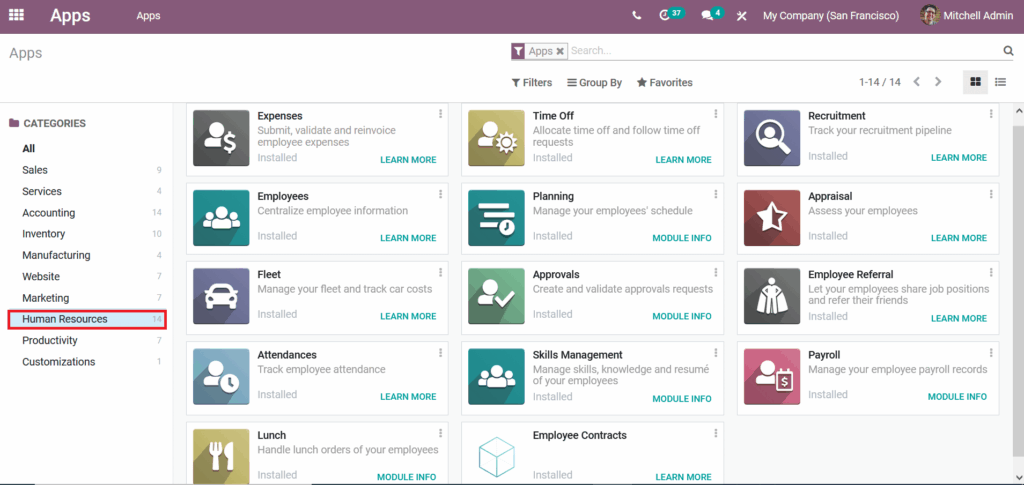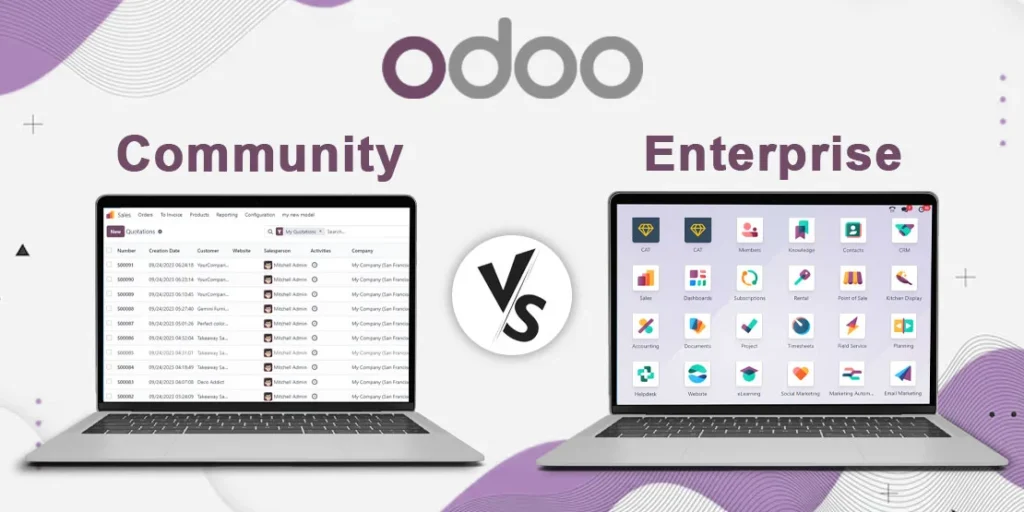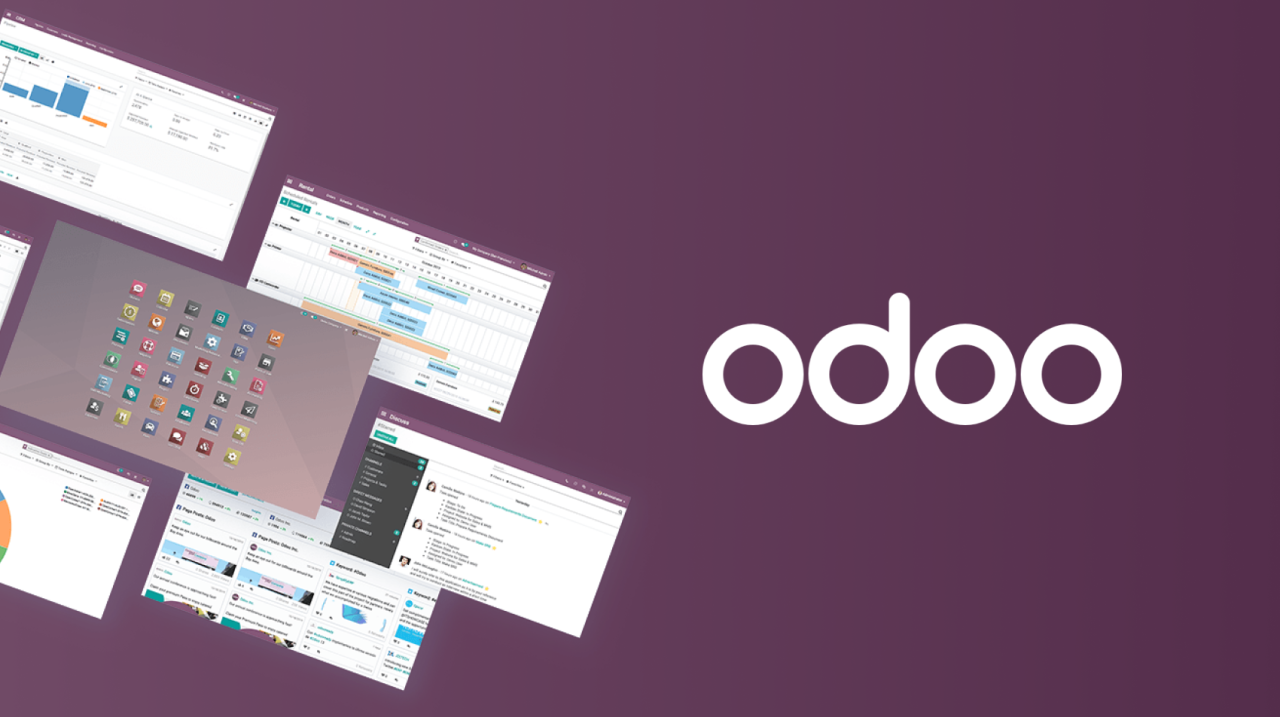What is Odoo software? Odoo is an open source enterprise resource planning (ERP) system, developed by Odoo SA, providing comprehensive management of business processes from Finance, Accounting, Sales, Purchasing, Warehousing, Manufacturing to Human Resources and Project Management. Odoo stands out for its flexibility, allowing businesses to customize and expand modules according to their own needs without depending on ERP solutions traditional.
Odoo started as TinyERP (2005), then evolved into OpenERP and officially became Odoo in 2014. The outstanding difference of Odoo compared to traditional ERPs is flexible modular structure, the ability to integrate a community of more than 17,000 applications, helping businesses choose only the necessary features without being constrained.
Let's find out with Bizzi in this article!
What is Odoo Software Architecture and Ecosystem?
Before we dive into the details of the modules and features, let's explore Odoo's architecture and ecosystemUnderstanding how Odoo is built and the available versions will help businesses understand customization, extensibility, and choose the most suitable version.

Open Source Architecture & History
Odoo Software uses the Python programming language, which is known for its extensibility, ease of customization and integration. The two main versions of Odoo today are:
- Odoo Community (open source): Free, suitable for small and medium businesses, easy to deploy, but requires technical knowledge to customize and handle advanced features.
- Odoo Enterprise (paid): Officially supported by Odoo SA, with added automation, AI, advanced reporting, and a more intuitive interface. Lower technical requirements thanks to direct Odoo support and constant updates.
Thanks to its open architecture and Python platform, Odoo is able to Expand modules, integrate with specialized software and automate business processes while still ensuring stability for the business.
Module Structure and Application Ecosystem
Odoo stands out for its flexible module structure with over 46 core modules and over 17,000 community apps. Businesses can Choose only the module that suits your needs., avoiding wasted resources and reducing deployment complexity.
Odoo Core Modules:
- Accounting & Finance: Helps automatically record revenue, expenses, track debts, and create real-time financial reports. This module supports cash flow control, input/output invoice management, and corporate budgeting.
- Sales & CRM: Manage your sales process, from lead management, quotes, orders to revenue forecasting.
- Purchase: Helps control input costs, manage suppliers, purchase orders, invoices and payments.
- Inventory & Manufacturing: Manage inventory, raw materials, production standards and production planning. This module connects directly to finance, helping to control raw material and inventory costs.
- Human Resources (HRM) & Project Management: Manage payroll costs, benefits, project costs, allocate resources and track work progress.
Odoo ecosystem enables businesses seamless module integration, ensuring data consistency across departments and creating a solid foundation for automating Finance – Accounting processes.
Odoo Community vs Odoo Enterprise Comparison: Guide to Choosing the Best One
When implementing Odoo, choosing Community or Enterprise edition is an important decision. This section will analyze in detail the advantages and disadvantages, costs and supporting factors to help businesses make the optimal choice for their operational needs.

Detailed comparison table
| Properties | Odoo Community | Odoo Enterprise |
| Expense | Free, pay only for implementation | Pay royalties + support services |
| Feature | Basic, no AI/Advanced Automation | AI, advanced reporting, process automation |
| Support | Mainly community | Official Odoo Team |
| Customization capabilities | High technical requirements | Built-in support, easy to customize |
| Suitable Object | SMEs, small businesses | Medium & large enterprises, high requirements for automation |
Analysis of determining factors
- Expense: When evaluating TCO (Total Cost of Ownership), businesses need to calculate the cost of implementation, customization, and maintenance, not just based on the initial price. Community helps save on licensing costs but increases internal IT costs. Enterprise reduces operating costs thanks to official support.
- Features: The Enterprise edition offers advanced automation, AI, and in-depth reporting features that Community doesn't, creating the ultimate platform for financial management.
- Support: Community Edition relies heavily on community and forums, risk of technical issues and updates. Enterprise has a professional Odoo team to support, reducing operational risks.
Analyzing Odoo's Role in Cost Management & Gaps that Need Dedicated Solutions
Odoo ERP provides an overall management platform, but does it meet the requirements of detailed cost management and back-office automation? This section will analyze the scope of cost control, current gaps, and why a dedicated solution like Bizzi.vn is needed.
Odoo ERP Cost Control Scope
Odoo helps track overall costs Through modules such as Accounting, Purchase and HRM. Businesses can manage invoices, procurement costs, payroll and project costs, generate consolidated reports and analyze cash flow. The Finance & Accounting module provides budgeting, cost forecasting and payment control capabilities.
Gaps and Limitations in Intensive Cost Management
While Odoo ERP is strong at the overall level, the complex back-office processes like batch processing of incoming invoices and in-depth management of internal expenses are still limited. The basic features in Odoo are not enough to:
- Automatically download and compare invoices using 3-way matching (Invoice – PO – Receipt).
- Categorize expenses in detail by department, project and monitor spending in real time.
Comprehensive ERP systems like Odoo are designed for overall management, not for automation and depth of back-office Finance operations.
Odoo ERP and Bizzi.vn Integration Strategy: Back-office Financial Automation
To achieve maximum efficiency in financial management, businesses can combine Odoo ERP with Bizzi.vn, taking advantage of the strengths of both systems.
- Automatic invoice processing:
Bizzi.vn uses AI and RPA technology to automatically download, check and reconcile invoices, including the mechanism 3-way matching (Invoice – PO – Warehouse Receipt). Thanks to that, businesses can minimize errors, shorten invoice processing time from a few days to a few minutes, and update data directly into Odoo ERP.
- In-depth expense control:
With Bizzi Expense, businesses can easily set up budgets according to department, project, or expense type, and monitor spending in real-time. This gives CFOs and accountants a precise view of internal costs that Odoo ERP doesn't provide at this level of detail, especially in complex back-office processes.
- Seamless integration:
Bizzi.vn is designed to integrate easily with Odoo ERP via API. Synchronizing invoice, expense and debt data between the two systems helps businesses leverage the power of both Odoo and Bizzi, improving operational efficiency, making cash flow transparent and reducing manual operations.
The combination of Odoo and Bizzi.vn helps businesses Optimize the entire Finance - Accounting process, reduce manual operations, limit risks and improve operational efficiency.
Suitable subjects & important notes when implementing
The implementation Odoo ERP Enterprises need to carefully consider the target users and the specific factors of the Vietnamese market. This section helps managers identify the right application and at the same time develop an optimal deployment strategy.
Who is Odoo suitable for?
Small and medium enterprises (SMEs):
Odoo is especially ideal for companies with limited resources but need a flexible, scalable ERP system. Thanks to its flexible module structure, businesses can deploy only the necessary subsystems such as Accounting & Finance, Sales, Purchasing, Warehouse and Manufacturing, minimizing initial deployment costs.
Suitable fields:
Odoo is suitable for many industries, helping to manage costs, revenue and operating processes effectively, including:
- Manufacture: Track raw material costs, inventory, production plans.
- Retail and trade: Sales management, CRM, inventory and orders.
- Service: Track projects, personnel costs, invoicing and revenue and expenses.
- Logistics & Distribution: Manage inventory, shipping, and control operating costs.
Thus, businesses clearly understand What is Odoo software? and how to apply it to meet real-world needs, from financial management to overall operations.
Barriers and solutions when implementing in Vietnam
- High technical requirements: Odoo implementation requires a qualified internal IT team to customize, maintain, and integrate the system. This is a challenge for many SMEs that lack specialized IT staff.
- Select implementation partner: For successful implementation, businesses should choose an experienced partner who understands accounting and tax regulations in Vietnam. A reputable partner will support configuration, staff training and resolve legal issues, ensuring the system operates smoothly.
- Optimization strategy: Instead of deeply customizing Odoo modules, businesses should consider using add-ons or specialized software like Bizzi.vn to add features for invoice automation, detailed expense management, and real-time cash flow monitoring. This helps shorten implementation time, reduce the risk of errors, and optimize operational efficiency.
Odoo & Bizzi – The Perfect Pair for Digital Transformation Finance – Accounting
Through the whole article, it can be seen that What is Odoo software? and why it is a comprehensive, flexible ERP solution for small and medium-sized businesses. Odoo provides the ability to manage all processes from finance, accounting, sales, purchasing to logistics and manufacturing, helping businesses optimize operations. However, when it comes to in-depth financial processes, especially processing incoming invoices, controlling internal expenses and monitoring cash flow in real time, Odoo still has certain limitations.
To overcome these limitations, businesses that are using or considering implementing Odoo should consider Bizzi.vn integration. Bizzi.vn adds features for invoice automation, in-depth expense management, and real-time cash flow monitoring. Combining Odoo ERP with Bizzi.vn helps businesses:
- Fully automate back-office financial processes.
- Reduce errors and invoice processing time and costs.
- Improve operational efficiency, transparency and accuracy in financial reporting.
Discover how now Bizzi.vn seamlessly integrates with Odoo to optimize Finance - Accounting processes and improve business management efficiency. Schedule a demo and experience the solution here: https://bizzi.vn/dat-lich-demo/


